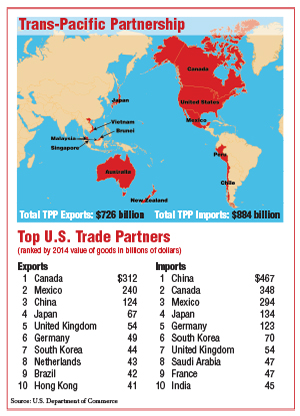Freight Firms Cheer Pacific Trade Deal

The Trans-Pacific Partnership, a free trade agreement hammered out by the United States and 11 Pacific Rim nations, is drawing praise from international freight carriers who see it as a powerful stimulus for business.
At the same time, however, labor leaders warn of manufacturing job losses and the deal could face opposition in Congress. It also could take years to be fully implemented, industry analysts told Transport Topics.
The Obama administration argues that TPP will boost U.S. exports and protect jobs of American workers by raising labor and environmental standards abroad, reducing tariffs and streamlining customs procedures.
President Obama said the agreement, which includes Canada and Mexico, is an improvement on the 1994 North American Free Trade Agreement because it contains mechanisms to enforce provisions in the agreement and eliminates taxes and fees on data, which is seen as a key to enabling the growth of online sales.
“Past trade agreements haven’t always lived up to the hype,” Obama said in releasing details of the agreement Nov. 4. Negotiations on the TPP deal wrapped up during October.
Besides the United States, Canada and Mexico, the trade agreement includes Australia, Brunei Darussalam, Chile, Japan, Malaysia, New Zealand, Peru, Singapore and Vietnam. They already account for nearly 45% of U.S. exports and 38% of imports.
Supporters say those numbers could grow significantly as countries reduce or eliminate tariffs on U.S. goods, such as agriculture products and cars, and U.S. firms shift manufacturing from China to countries such as Malaysia and Vietnam.
“TPP is a landmark trade agreement that tremendously expands opportunities for all businesses,” said Sharon Young, communications adviser for FedEx Corp. in Washington, D.C. “Our customers, especially the small and medium businesses globally, will benefit from the transparency and speed of having customs clearance rules simplified and tariffs reduced.”
FedEx ranks No. 2 on the Transport Topics Top 100 list of largest for-hire carriers in the United States and Canada.
A spokeswoman for UPS Inc. said TPP will help expand trade with the six countries that already have trade agreements with the United States (Canada, Mexico, Australia, Chile, Peru, Singapore) and open up markets in the other countries.
“With a combined population of over 250 million people, the new countries have the potential to become vibrant new markets for U.S. exports,” UPS’ Kara Ross said.
UPS ranks No. 1 on the for-hire TT100, and its Supply Chain Solutions unit tops the TT logistics 50 list.
Brandon Fried, executive director of the Airforwarders Association in Washington, D.C., said he expects to see U.S. companies move production from China, which is not part of the TPP, to countries such as Vietnam.
“I was in China last week,” Fried said in a Nov. 9 interview. “You can see it. Manufacturing is being done in places where it is less expensive.”
That could put a damper on efforts to locate production closer to end markets, a trend known as near sourcing. “It’s going to make buyers think twice,” Fried said.
A significant increase in trade likely will add to congestion woes at West Coast ports, Fried said. He also expressed concern about staffing levels at customs facilities.
“The U.S. has to up its game,” he said.
The main beneficiaries of the trade deal, according to a fact sheet distributed by the White House, will be:
• Agriculture: TPP will eliminate import taxes as high as 40% on U.S. poultry products, 35% on soybeans and 40% on fruit exports.
• Manufacturing: TPP eliminates import taxes as high as 35% on U.S. information and communication technology exports to TPP countries.
• Services: TPP lifts complex restrictions and bans on access affecting U.S. exports, including retail services, communications services, logistics services, entertainment and software.
“TPP has the potential to become the most significant free trade agreement in history,” said Jeff Rosensweig, an associate professor of international business and finance at Emory University in Atlanta. Compared with Nafta and other regional trade agreements, TPP “spans an ocean and unites hemispheres,” he added.
Rosensweig, however, cautioned that the deal faces opposition and could take years to implement.
Teamsters General President James Hoffa denounced TPP last week as “a punch to the gut” of U.S. workers.
“The TPP text contains many of the most controversial items included in past lousy trade agreements that will continue to encourage job outsourcing and lower wages for U.S. workers,” Hoffa said in a statement issued Nov. 11. “It leaves Congress with just one option when it comes to considering TPP — just say no.”
Rosensweig agreed the trade deal will be a hard sell.
“I don’t think it will be ratified by Congress,” he told TT. “We already see that candidates for president are finding it a ‘third rail’ [issue]. Economists, such as myself, can extol the benefits of free trade. However, many voters can be convinced that TPP equals U.S. jobs lost overseas. Even if untrue, that is not a winning formula in an election year.”

